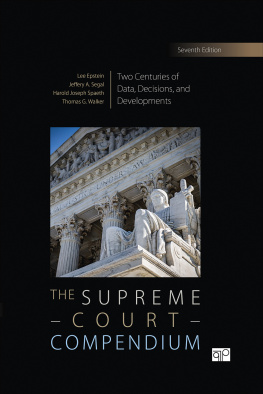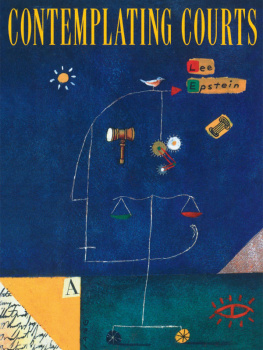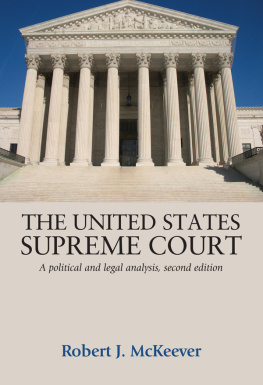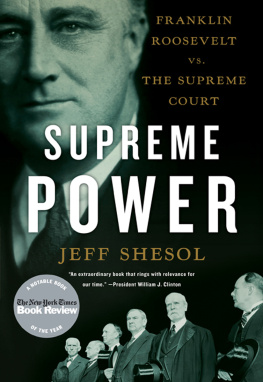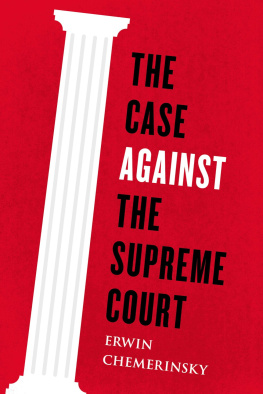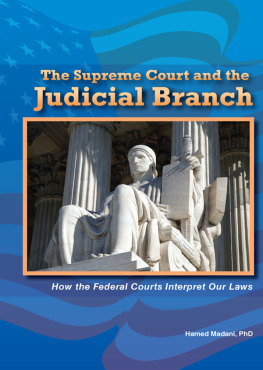The Supreme Court Compendium
Seventh Edition
In memory of our co-author, mentor, colleague, and great friend, Harold J. Spaeth
The Supreme Court Compendium
Two Centuries of Data, Decisions, and Developments
- Lee Epstein
- Washington University in St. Louis
- Jeffrey A. Segal
- Stony Brook University
- Harold Joseph Spaeth
- Michigan State University
- Thomas G. Walker
- Emory University
Seventh Edition
FOR INFORMATION:
CQ Press
An Imprint of SAGE Publications, Inc.
2455 Teller Road
Thousand Oaks, California 91320
E-mail: order@sagepub.com
SAGE Publications Ltd.
1 Olivers Yard
55 City Road
London EC1Y 1SP
United Kingdom
SAGE Publications India Pvt. Ltd.
B 1/I 1 Mohan Cooperative Industrial Area
Mathura Road, New Delhi 110 044
India
SAGE Publications Asia-Pacific Pte. Ltd.
18 Cross Street #10-10/11/12
China Square Central
Singapore 048423
Copyright 2021 by CQ Press.
All rights reserved. Except as permitted by U.S. copyright law, no part of this work may be reproduced or distributed in any form or by any means, or stored in a database or retrieval system, without permission in writing from the publisher.
All third-party trademarks referenced or depicted herein are included solely for the purpose of illustration and are the property of their respective owners. Reference to these trademarks in no way indicates any relationship with, or endorsement by, the trademark owner.
Printed in the United States of America
ISBN: 978-1-0718-3456-5
This book is printed on acid-free paper.
Acquisitions Editor: Laura Notton
Production Editor: Megha Negi
Typesetter: C&M Digitals (P) Ltd.
Proofreader: Eleni Maria Georgiou
Indexer: Integra
Cover Designer: Candice Harman
Marketing Manager: Brianna Griffith
Preface
As professors who teach courses and conduct research on courts and law, we became increasingly frustrated with the absence of a comprehensive collection of information on the U.S. Supreme Court. It seemed that each time we needed even the simplest datum, whether it be a Senate vote on a particular nominee or the number of cases argued during a given term, we had to consult three or four different books and articles to find the desired information. This sense of frustration led to the compilation of the first edition of The Supreme Court Compendium: Data, Decisions, and Developments.
Our goal for this seventh edition is the same as it was for the first six: to provide a comprehensive collection of data and relevant information on the U.S. Supreme Court. We have attempted to cover as many bases as possible, from characteristics of the Court and its members, to the environment in which it operates, to the publics views on its decisions and perceptions about the Court itself, and much more. We have sought to provide readers with some insight into how we collected the data and why we consider them important. We urge readers to use both the general introduction and the introductions included with each chapter as guides to the information presented in the tables and figures that follow. Readers should also pay particular attention to table notes, where we identify data sources and, when relevant, caution readers about potential irregularities in data interpretation.
Of course, there are differences between this and the previous editions. First and foremost, using the legacy version of the U.S. Supreme Court Database (more on the Database in the introductory chapter), we backdated many tables to the Courts very first decisions in 1791. Second, we updated virtually every table. So, for example, readers will find a wealth of information on the personal and professional backgrounds of the Courts three most Trump appointeesAmy Coney Barrett, Neil Gorsuch, and Brett Kavanaugh. Both the backdating and updating will be of particular value to researchers who wish to conduct longitudinal analyses of the Court and its members; they now have highly reliable data since the Courts earliest days. Third, we continue to refine the tables so that they are as useful as possible to a range of readers. Accomplishing this goal led us to rethink several tables, especially in . Finally, for one table in each chapter we wrote a data literacy note with an eye toward helping readers understand more fully the tables contents and providing them with suggestions on how they might analyze and interpret the data.
One final note. Putting this edition together required us to work with a great deal of data. Although we took pains to check and recheck all the tables, it is possible that we committed errors of omission and commission. Naturally, we take responsibility for both. We ask readers who find errors in the text or tables to please contact us so that we may remedy them in subsequent editions and for the online version. Please direct email to Lee Epstein at epstein@wustl.edu. In revising this (and previous) editions, we have benefited greatly from our readers and encourage them to contact us about this one as well.
Many people assisted us in producing this and earlier editions of The Supreme Court Compendium. The folks at CQ Press were, as always, terrific. We initially pitched the project to Brenda Carter, who provided a great deal of encouragement. Our editor for the first edition, Jeanne Ferris, could not have been more helpful or patient. She read the entire text and considered all the tables with an eye toward clarity and readability. This edition continues to reap the benefits of Jeannes keen interest. Sarah J. Walker served as the development editor on the 5th edition and Laura Notton, on this edition, as well as on the 6th. We thank them both for their awesome contributions and especially their eagle-eyes.
We have fabulous colleagues in the law and courts fieldmany of whom took the time to offer suggestions and even data, for this and earlier editions. We are especially indebted to Judy Baer (Texas A&M), Ryan Black (Michigan State University), Gregory Caldeira (Ohio State University), Micheal Giles (Emory University), Leslie Goldstein (University of Delaware), Valerie Hoekstra (Arizona State University), Tim Johnson (University of Minnesota), Jack Knight (Duke University), William M. Landes (University of Chicago), Richard Lazarus (Harvard University), Andrew D. Martin (Washington University in St. Louis), Jan Palmer (Ohio University), Kevin Quinn (University of Michigan), Richard A. Posner (U.S. Court of Appeals for the Seventh Circuit and the University of Chicago), Jim Spriggs (Washington University in St. Louis), and James Stimson (University of North Carolina).
Research assistants at our respective institutions performed various essential tasks throughout this undertaking. Since this edition builds on the first five, we want again to acknowledge a generation or two of our former students (many of whom are now professors): Emily Baehl, Ellen Baik, Ryan Black, Scott Comparato, Justine DElia Kueper, Paul Fabrizio, Marjorie George, Tracey George, Scott Graves, Chris Hasselman, Marc Hendershot, Robert Howard, Tim Johnson, Chad King, Maxwell Mak, Madhavi McCall, Robert Oritz, Kirk Randazzo, Melissa Schwartzberg, Eddie Sindaco, James Spriggs, Jeff Staton, Zachary Truelson, and Elyce Winters. In addition, we are grateful to Ryan Black, Paul Collins, Tim Johnson, Andrew Koshner, Andrew Martin, Ryan Owens, Kevin Quinn, Rorie Spill, Jim Spriggs, and Christina Wolbrecht, for making their data publicly available.

